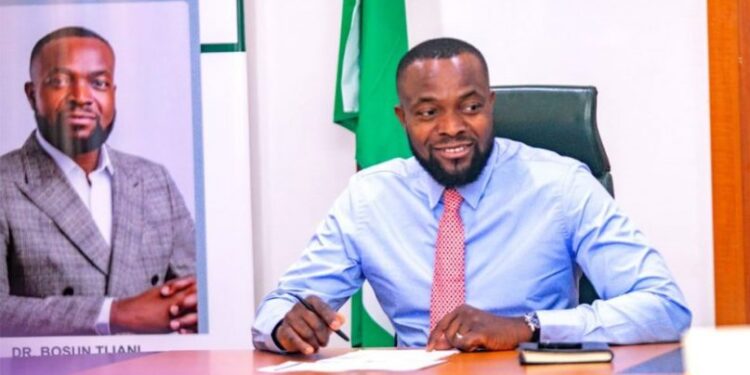The Minister of Communication, Innovation and Digital Economy, Dr. Bosun Tijani, has said the Federal Government is targeting the provision of internet access for 20 million Nigerians, leveraging the Nigerian Communications Satellite Limited (NigComSat).
The minister, represented by the Director, National Centre for Artificial Intelligence and Robotics (NCAIR), Ajala Olubumi, disclosed this on Tuesday during an exclusive public and private sector stakeholders’ engagement roundtable hosted by AI-powered telemedicine platform MySmartMedic and attended by Nairametrics.
The development comes weeks after NigComSat unveiled plans to generate N8 billion in revenue within the next three years by expanding its broadband services across Nigeria.
Leveraging NigComSat
According to Olubumi, telemedicine innovation requires connectivity to benefit the population.
He added that with the Federal Government’s NigComSat, areas that lack internet access will be reached.
“For technology like this to truly deliver transformation, we must have connectivity. And we still have about 20 million Nigerians that have no access at all to the internet.
“We’re leveraging that by combining NigComSat to beam internet to locations because Nigeria is one of the few nations in West Africa with its own satellite,” he said.
On his part, the National Commissioner/CEO of the Nigeria Data Protection Commission (NDPC), Dr. Vincent Olatunji, urged Health Maintenance Organizations (HMOs) and telemedicine platforms in Nigeria to embed data protection at the architecture stage of their applications in compliance with Nigeria’s data protection laws.
Represented by an official of the Commission, Barr. Alexander Onwe, Olatunji emphasized that while the digital transformation of healthcare is not only inevitable but also critical for achieving universal health coverage, strengthening health systems, and expanding access to underserved populations across Africa, compliance with data protection laws—particularly those guarding against privacy breaches—cannot be overemphasized.
Onwe noted that telemedicine, electronic medical records, AI-powered diagnostics, remote monitoring, and mobile outreach have become essential tools in bridging healthcare access gaps, as they provide speed, scalability, affordability, and widespread reach.
However, he stated that with this transformation comes profound responsibility, adding that legal compliance is essential to ensure that the very data powering digital healthcare does not become a threat to the dignity, privacy, or security of individuals being served.
He stressed that the Nigeria Data Protection Act (NDPA) 2023 is an indispensable pillar in building an equitable and trustworthy digital health ecosystem and mandates full compliance by operators.
He highlighted that for medical and telemedicine services, explicit, informed, and unambiguous consent is often required, especially where remote consultations and automated decision-making tools are used.
He also urged telemedicine operators to collect only essential data, retain it only for as long as necessary, and use it strictly for the purpose communicated to users.
He stressed that, as telemedicine often involves cross-border cloud hosting, remote specialists, or foreign technology partners, the NDPC should be engaged for Commission-approved safeguards for such transfers.
More Insights on Telemedicine Adoption
Speaking during a press interview, the founder of MySmartMedic, Dr. Chuks Ekweme, said the objective of the telemedicine app is to bridge gaps in health advisory by enabling doctors to consult from the comfort of their homes.
He emphasized that telemedicine innovation is critical and should be supported, especially considering the ratio of one doctor to 4,000 patients in Nigeria, noting that the country has yet to meet the World Health Organization’s recommended ratio.
What to Know
According to a 2023 research report by Emergen Research, the global telemedicine market size is projected to reach $450 billion by 2032, up from $84 billion in 2022, and is expected to register a compound annual growth rate (CAGR) of 18.3% during the forecast period.
- The report shows that major factors driving market growth include the shortage of healthcare professionals, technological advancements in telecommunications and telemedicine, government initiatives and awareness, rising demand for remote healthcare services, increasing smartphone penetration, and the rise of artificial intelligence, Internet of Things (IoT), big data, and virtual assistance.
- Expert analysis, however, indicates that although the private sector already delivers over 60% of healthcare services in Nigeria, its footprint remains fragmented, concentrated in urban areas, and often inaccessible to rural and low-income populations.

























